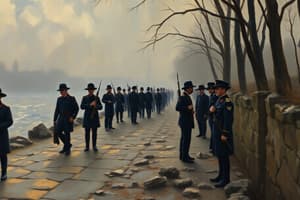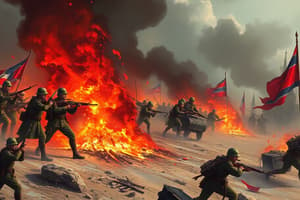Podcast
Questions and Answers
Which of the following was a reason for the US to enter World War I?
Which of the following was a reason for the US to enter World War I?
- To defend its colonies in Europe
- To respond to Germany's resumption of unrestricted submarine warfare (correct)
- To support the Russian Revolution
- To avenge the sinking of the Lusitania
What was the main goal of the Treaty of Versailles?
What was the main goal of the Treaty of Versailles?
- To establish a new world order with the League of Nations
- To ensure the neutrality of Switzerland
- To redistribute colonies among the Allied powers
- To punish Germany and impose harsh penalties (correct)
What was the significance of the Western Front during World War I?
What was the significance of the Western Front during World War I?
- It was a stalemate where trench warfare was prevalent (correct)
- It was a minor front with little significance
- It was the site of a major Allied victory
- It was a decisive battleground where the war was won
What was the main cause of the Russian Revolution?
What was the main cause of the Russian Revolution?
What was the main goal of Lenin's 5-year plans?
What was the main goal of Lenin's 5-year plans?
What was the main objective of Stalin's 5-year plans?
What was the main objective of Stalin's 5-year plans?
What was the main purpose of the League of Nations?
What was the main purpose of the League of Nations?
What was the main characteristic of totalitarianism?
What was the main characteristic of totalitarianism?
What was the primary reason for the acceptance of Hitler and Mussolini as leaders?
What was the primary reason for the acceptance of Hitler and Mussolini as leaders?
What was the main goal of the New Deal, implemented by President Franklin D. Roosevelt?
What was the main goal of the New Deal, implemented by President Franklin D. Roosevelt?
What was the purpose of the Munich Conference in 1938?
What was the purpose of the Munich Conference in 1938?
What was the significance of the Nuremberg Trials?
What was the significance of the Nuremberg Trials?
What was the main cause of the Cold War?
What was the main cause of the Cold War?
What was the purpose of the Truman Doctrine?
What was the purpose of the Truman Doctrine?
What was the consequence of the guerrilla warfare used in the Vietnam War?
What was the consequence of the guerrilla warfare used in the Vietnam War?
What was the result of the Soviet Union's command economy?
What was the result of the Soviet Union's command economy?
Flashcards are hidden until you start studying
Study Notes
World War I
- Leaders during WWI:
- Russia: Nicholas II
- US: Woodrow Wilson
- Germany: Kaiser Wilhelm II
- The US entered the war in 1917 due to:
- Germany's unrestricted submarine warfare
- The sinking of the Lusitania
- The Zimmermann Telegram
- The significance of the US entering the war: it shifted the balance of power in favor of the Allies and led to Germany's defeat
- Causes of WWI:
- Imperialism
- Nationalism
- Militarism
- Immediate cause of WWI: Assassination of Archduke Franz Ferdinand
- Russia supported Serbia due to Slavic ties and a desire to expand its influence in the Balkans
- Germany supported Austria-Hungary due to a desire to expand its influence and protect its ally
- Alliances before WWI:
- Triple Entente: France, Russia, Britain
- Triple Alliance: Germany, Austria-Hungary, Italy
Russian Revolution and Inter-War Period
- Russia left the war in 1917 due to the October Revolution and the rise of the Bolsheviks
- The Treaty of Versailles aimed to punish Germany and impose harsh penalties
- The goal of France and Britain in the Treaty of Versailles was to weaken Germany and prevent future aggression
- The 14 Points were a set of principles outlined by Woodrow Wilson to promote peace and prevent future wars
- The German government after WWI was the Weimar Republic, which was initially unpopular among the German people
- The League of Nations was established to promote international cooperation and prevent future wars
- The purpose of the League of Nations was to provide a forum for nations to resolve disputes peacefully
World War II
- Japan and Italy fought with the Allies due to their own interests and a desire to expand their empires
- The holocaust was a genocide of six million Jews and millions of others deemed undesirable by the Nazi regime
- Kristallnacht was a wave of violent attacks against Jews in Germany in 1938
- Germany's last stand was the Battle of Berlin in 1945
- The Nuremberg trials were a series of trials of top Nazi officials for war crimes
- The Munich Conference was a failed attempt to appease Nazi Germany and avoid war
Cold War
- The Cold War was a period of diplomatic, economic, and ideological tension between the US and the USSR
- The Yalta Conference was a meeting of the Allied leaders to discuss post-war reorganization
- Causes of the Cold War:
- Ideological differences between capitalism and communism
- Mutual suspicion and mistrust
- Competition for global influence
- The Truman Doctrine was a policy of providing economic and military aid to countries threatened by communism
- The Great Leap Forward was a failed economic and social plan in China that led to widespread famine
- The establishment of the Jewish State of Israel in 1948 led to conflict with Arab nations
- The Soviet Union collapsed in 1991 due to economic stagnation, corruption, and nationalist movements
- NATO is a military alliance formed to counter the Soviet Union's Warsaw Pact
- The US got involved in the Vietnam War to prevent the spread of communism
- Guerrilla warfare in Vietnam led to a prolonged and costly conflict
Studying That Suits You
Use AI to generate personalized quizzes and flashcards to suit your learning preferences.




